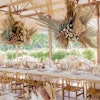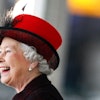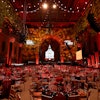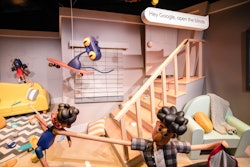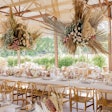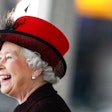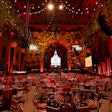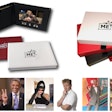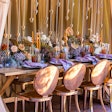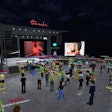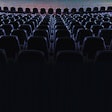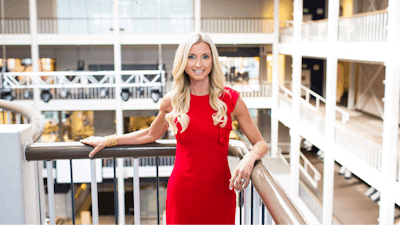
SAN FRANCISCO—For almost a decade, Gianna Gaudini served as an executive event producer at Google where she specialized in large-scale conferences, women's events, and more. She released her first book, The Art of Event Planning, on June 18; it includes case studies from her time at the tech giant and shares tips for building a team, defining a target audience, finding a venue, and more.
In an interview with BizBash, she teased the book, discussed how she infused human emotion into Google's tech-focused events, gave tips for surprising and delighting an audience, and shared why she thinks that "everyone is an event planner."
First of all, what type of events did you produce at Google?
I produced Google's most strategic, highly visible events. So for instance, for the past three years I produced Google's largest external event, Google Cloud Next—last year we reached over 30,000 attendees. I was on the team for almost a decade, so I've planned everything from our core business events to our Think series. I've done random reputation events, which has taken me to political conventions and the White House Correspondents' Dinner. And recently, I've been focused a lot on leading our women's events. I've even produced a couple of film premieres—I write in my book that I never would have thought I'd be producing film premieres at a tech company, but with a brand like Google there are opportunities.
In addition to the new book, your website offers practical tips for things like event budget and defining messaging; you also provide consulting services. Why was it important for you to educate the industry on top of your busy day job?
What I've learned over the years is that everyone is an event planner. Who hasn't planned a birthday party, a dinner, a bachelorette party, a wedding, a graduation? So at some point, so many of my contacts had reached out to me asking for tips. Before having my son a couple years ago, I had more time to respond. Now, writing my book and creating a platform via my website became a way to scale my tips for creating successful events, be they a small dinner party or a large, complex corporate event.
There are some overarching principles that apply to every type of event, and I wanted to create tips that can help everybody. On my website, I offer a bit more in the lifestyle department, whereas my book has more of a focus on what I've learned in my corporate-planning career. There's a chapter on how to apply corporate principles to social events, so the book does apply to a wide demographic. Photo: Courtesy of Gianna Gaudini
Photo: Courtesy of Gianna Gaudini
Speaking of that, do you see a lot of overlap between corporate events and social events?
I think they are very different. When I started planning my own wedding eight years ago, everybody said, "Oh, you've got this in the bag. I'm sure you're planning your own wedding." But actually, I wanted to interview people to be my consultants, because I didn't understand the intricacies of wedding planning. Within the event planning industry, there are specialists in different areas who bring to the table insights that other specialists don't have.
The one overarching thing that I encourage any event planner, big or small, to do is to start with intention versus aesthetics. In today's world, everybody's flooded with content and pictures on Instagram and Pinterest, and everybody knows what they want their event to look like. I think they get overwhelmed by, "I want this, I want that, I want that."
I encourage everyone to back out of that and pick three main takeaways you want from an event. And with every decision you make, go back and make sure that your budget and your resources are supporting those three main goals. It really helps with budget prioritization and decision-making, and it cuts through a lot of the clutter and makes your event more cohesive and impactful.
Your book also touches on ways to balance technology with human interaction. I imagine that was a big focus with Google's events. Can you share any insights you've learned?
Something I always said was, "Look, even though we're a tech company, let's not add tech for tech's sake." We were adding demo after demo and thought, "Is this really what attendees want? Is it helpful to them? Or are we just creating noise that's detracting from our core narrative and messaging?"
Polling shows that the word people associate the most with Google is helpful. So when I planned events, I tried to translate that ethos. How are we being helpful above all else to our attendees? When we integrate technology it should be to enhance the experience, not to be flashy. If it's an event app, let's make that app helpful and not confusing.
As a fun example, about six years ago there was a big push for Google Hangouts. It was one of our new products, and I wanted to create a way to make the demo a bit more fun and memorable. One of those ideas was that during an event reception, I had wine and beer tastings, and I'd have a famous sommelier or master brewer on the Hangout remotely. People could be doing a tasting in Mountain View while this master sommelier was walking them through it from New York.
And what was so cool was at some point, the expert would call on someone in the room and say, "You in the green shirt, how do you like that Sauvignon Blanc?" People are so used to thinking that a screen is like a one-way interaction; when they realize that the person on the screen was communicating with them, that drove home the point of why Hangouts are so transformative.
It makes it more attainable for everyday people who may not fully understand the tech.
Exactly. We try to weave the narratives. So, if you want to integrate tech or a new product into your event, think about how you were positioning it. If I have a keynote where I'm announcing a new product, it's advantageous and strategic to have a demo right outside the keynote with a product team member available to discuss it with attendees that are coming out. That way, they've heard about it and then immediately after they can demo it without having to cross the campus. So, it's good to be mindful about cadence at events as well when you're space planning.
You also write a lot about surprising and delighting your audience. Any favorite tips you can tease?
This is one of my favorite topics. I write about it a lot in the book—I've had everything from an executive skydiving into my event! Obviously, the everyday planner isn't going to be able to produce that kind of surprise and delight. But what I like to say is, if you're stuck on how to do it maybe start with taking away pain points. What emotions do you want your attendee to feel? Are there potential pain points you can eliminate to create a small moment of joy?
As a recent example, at Google Cloud Next we had thousands of people lining up for our keynote early in the morning. They're waiting outside in the cold, they're skipping their coffee and breakfast. So we reward them by providing doughnuts and coffee and snacks and even music for them. It's all presented in cute packaging, and you can see the smiles on their faces as they think, "They were thinking of us. They know we're out here." They also end up taking a picture and sharing it—so not only are you creating surprise and delight for them, but you're also helping yourself as a brand and spreading the word on social.
As a bonus, you're also reducing the need for attendees to line up inside the venue for coffee because we've already taken care of it. Surprise and delight can be strategic as well.
Shifting focus, your book also touches on the importance of leadership skills and interpersonal skills. What are some traits and abilities a strong leader in the event industry needs?
I was at the Ted Conference in Vancouver last spring, and I'll never forget this one slide that talked about jobs that will never be eradicated by the advent of artificial intelligence and machine learning. One of those was event planner.
The job of the event planner will never become automated. There's plenty of event-planning software, but there are just so many intricacies when it comes to planning and so much of it comes down to negotiating interpersonal relationships and being able to run prioritization exercises and make quick decisions using insights that you have. It just really takes a high level of emotional intelligence and deduction skills that I just don't think will ever become automated.
My book has a career section where I talk about how to stand out and establish your niche within the massive event industry. And one of the things that I talk about is that there are specialists and generalists, and there are definitely advantages to both. For me in particular, I didn't get a CMP or any of the formal event-planning certifications—but I still wanted a way to build skills. So I got multiple certifications that improve who I am as a planner and help me stand out. I got my sommelier certification and I got my interior design certification and I also learned how to be kind of a maverick when it comes to contract negotiations.
As you're thinking long term about your career, I think it's a good idea to figure out if you want to specialize. If you have something that you're passionate about and can become an expert in, you actually make yourself super marketable.
On the flip side, are there certain qualities you look for when hiring someone?
Team dynamic can make or break your event, and that has to do with both your internal team and the agencies that you work with. You definitely want to make sure that your team has the same work style, the same work ethic. I like to say, "No ego"—let's leave the egos at the door.
I think there should be at least three types of people on any successful event team: a creative, a strategist, and a producer. The strategist will keep the big-picture goals in mind and help create a strategy for your event that will achieve those goals. The creative will see things differently than everybody else and be able to hone in on the aesthetics and create a brand moment. And then the producer will get shit done. You can have a great strategy and beautiful aesthetic ideas, but it's the producer who's going to make sure that things are on time, on budget, and on brand throughout the process.
What's the number-one thing you hope people learn from this book?
That everyone is an event planner—and everyone can be a more successful event planner. When I think back on my life, some of the things that stand out the most are events that have happened over the years. Every time we're planning an event, we're creating a memory, and you can either live life by accident or life by design. I help people live a life by design to create better memories.
Gianna Gaudini's book is available now on Amazon and through giannagaudini.com. This interview has been edited and condensed.
